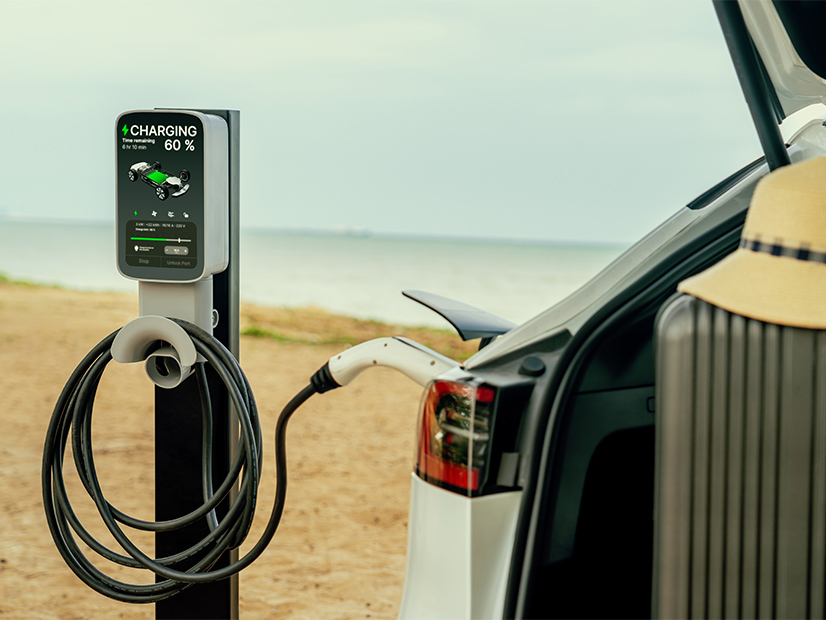New Jersey has awarded $12.7 million in grants to install electric vehicle chargers at 405 new locations, including multiunit dwellings and tourism hot spots, as the state seeks to dramatically increase EV use in the face of some opposition to the move.
The New Jersey Board of Public Utilities (BPU) made the awards in three programs designed to provide incentives for specific market sectors believed to be key to creating a critical mass of EV chargers. The awards were made in the program’s third round, from the 2023 budget, and the agency is accepting applications for the 2024 funding round, which closes Nov. 30.
The targeted sectors include: multiunit dwellings, because they are tough for EV-owning occupants to install their own chargers in; tourism sites, to encourage EV drivers who might balk at coming to New Jersey visitor attractions for fear they won’t be able to recharge; and publicly owned fleets supporting local governments, which can lead by example, showing residents the benefits of EVs.
BPU President Christine Guhl-Sadovy announced the awards Monday, saying they are part of the agency’s effort to ensure drivers in all corners of the state have a place to plug in. The state had 2,047 Level 2 chargers and 972 Direct Current Fast Chargers in June, or about one charger per 3,050 residents, according to EvaluateNJ, an EV information website run by Atlas Public Policy.
“As we strive to combat the increasingly devastating impacts of climate change, reducing barriers to using an EV by building a robust network of public charging stations and supporting municipalities in electrifying their fleets remains a key focus of our clean energy agenda,” Guhl-Sadovy said.
The funding outlined Monday would increase the state’s charger total by about 13.5%.
Convenient, Affordable Charging
Last week, Gov. Phil Murphy (D) outlined a $10 million funding allocation to the state Department of Environmental Protection, about 80% of which went to “workplace and multi-dwelling charging station projects across the state.” He said the state is trying to make “the transition to electric vehicles more accessible and affordable than ever.” A BPU spokesperson said the two programs are unrelated.
The DEP’s EV charging funds go through the agency’s “It Pay$ to Plug in” program, which offers up to $4,000 for the installation of a single-port charger. The program has awarded about $14 million, funding the installation of 1,261 charging stations with 1,891 ports at 389 locations, according to the DEP.
“Convenient and affordable charging at home and at the workplace is core to our overall charging ecosystem, since that’s where the majority of charging will occur,” DEP Commissioner Shawn M. LaTourette said in a release at the time. “We must continue to act with the sense of urgency the climate crisis demands.”
About 37% of New Jersey’s carbon emissions are generated by transportation. The BPU’s EV charger announcement comes as the DEP moves to enact California’s Advanced Clean Cars II (ACC II), which requires that EVs account for a steadily rising share of new car sales until 2035, when all new vehicles bought in New Jersey must be EVs.
The rules, which eight states have adopted, is opposed by businesses, car dealers and fossil fuel interests, who say consumers aren’t ready for the move and the state doesn’t have the grid or charging infrastructure to cope with such a dramatic increase in EVs. (See NJ’s Push Toward Clean Cars Rule Sparks Vigorous Debate.)
Wine, Farming And A 280-year-old Restaurant
The round of BPU funding detailed Monday was about the same as in the previous round, which awarded $12.65 million through the three programs for the collective installation of 1,150 Level 2 and DCFC chargers and 106 public vehicles.
About half of the money outlined Monday — about $6.1 million — will pay for the installation of more than 1,300 chargers in multiunit dwelling residences. The agency’s MUD EV Charger Incentive Program awards up to $4,000 for a dual-port, Level 2 charging station in a multiunit development and up to $6,000 if it is in an overburdened community.
The Electric Vehicle Tourism Program, which provides up to $5,000 for a Level 2 charger and up to $50,000 for a Direct Current Fast Charger, awarded nearly $800,000 in two phases of the announced funding. The money will trigger the installation of 37 chargers, including: four Level 2 chargers at Phillips Farms, a 300-acre Central Jersey family farm that allows you to pick your own fruit and vegetables; two Level 2 chargers and two DCFC’s at Beneduce Vineyards, a fourth-generation winery in South Jersey; and two DCFCs at The Clinton House, a historic restaurant first opened in 1743. (See NJ Seeks to Lure Tourists with EV Chargers.)
The $5.75 million awarded in the Clean Fleet EV Incentive Program will fund local schools, municipal commissions, state agencies or boards, and other local government bodies to help transition their fleets to EVs. The program awards up to $4,000 for the purchase of a light-duty EV, up to $10,000 for a Class 6 electric truck, up to $5,000 for a Level 2 charger and up to $50,000 for a DCFC.
The 36 grants will pay for 140 EVs, 25 DCFCs and 124 Level 2 chargers. The recipients include the Passaic Valley Sewerage Commission, which received $1.4 million for five EVs, eight DCFCs and 15 Level 2 chargers. New Jersey Transit, the state’s mass transit agency, received about the same for 20 EVs, six DCFCs and 15 Level 2 chargers.



